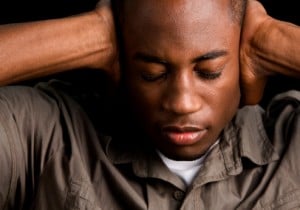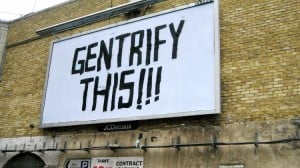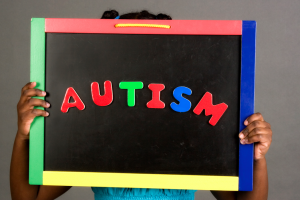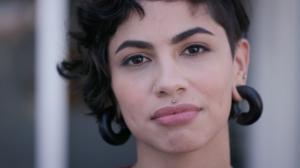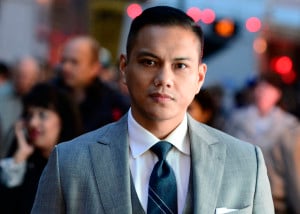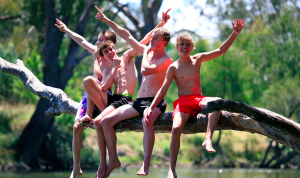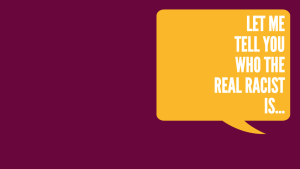Originally published at #HERCollective and republished here with permission.
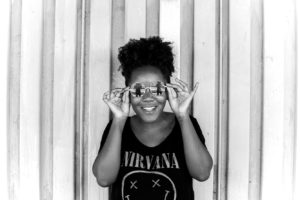
A smiling person adjusts their glasses, which have stick figures painted on its lenses. Image courtesy of Courtney Lowe.
I can’t remember a time when I wasn’t polyamorous.
Of course, I didn’t refer to myself as a polyamorous person until I discovered there was actually a name for the way I felt about relationships – it was simply who I was.
When puberty began and my vagina began to pulsate randomly and my nipples developed a mind of their own, I started to think of myself as a sexual being. I began to explore other beings romantically and sexually and, through that exploration, realized that my natural understanding of relationships differed greatly than the people around me.
My best friend moved when I was in elementary school and I remember sharing my strong feelings for a few boys in my class with a girl I started playing with at recess. I pointed out all the boys I liked to her and began to describe in detail all the reasons why I thought they were great.
Before I could finish describing my feelings for the third boy, she cut me off and quite sternly told me that I “couldn’t” like all of those boys.
I didn’t understand what she meant by “couldn’t.” I knew I wasn’t lying, I did like all of those boys, and I liked them at the exact same time. I tried to explain my feelings to her, but she thought I was ridiculous.
She promptly told me that girls that like more than one boy at the same time are sluts, and she doesn’t hang around sluts. She never spoke to me again but wasted no time in sharing how despicable and “slutty” I was to the rest of my classmates.
I liked a lot of boys, so that meant I was a slut. I didn’t quite understand it, but I was not going to pretend that I did not like all the boys that I did. I was very confused as to what exactly the problem was.
That was my first, but certainly not my last, experience of being judged and shamed for being honest about liking several boys at the same time.
As I got older, I learned to be a bit more strategic in the way I communicated what I instinctively knew I wanted both romantically and sexually – particularly because every time I shared how I really felt and what I really wanted in a relationship, it was immediately associated with promiscuity.
It became overwhelmingly hurtful to be judged so often, especially for something that felt so natural and pure for me, so I decided I would be very careful about who I shared my desires with. It wasn’t until I was in college that I even discovered polyamory and the polyamorous community.
The word “polyamory” is defined as “the practice of, or desire for, intimate relationships where individuals may have more than one partner, with the knowledge and consent of all partners.”
You can’t imagine my joy when I found out about polyamory. Having spent years wandering around with these feelings, and with the desire for multiple concurrent relationships with a combination of people bottled up inside, I suffered deep and dark feelings of isolation. After some years, I had convinced myself that I had to learn monogamy if I was ever going to have a “normal” life. I knew I wanted to be married and have children and just experience love. But because I had not found anyone that saw love in the way that I saw it, there must be something wrong with my way of thinking… right?
So when I found out there was an entire polyamorous community, I was so happy that I was wrong in thinking nobody saw love and relationships as I did, and I burned any thought of monogamy that had been bouncing around in my head.
Now that I knew the name for what I was, I began to search the internet looking for my community. I found dating websites geared specifically towards polyamorous people as well as monthly meet-ups in my city. I decided that since I was “technically” new to the community and wasn’t familiar with the appropriate language for certain things, it would be best if I took things slow.
I eagerly made my profile, posted my picture, and filled my about me section with large paragraphs describing my history of being polyamorous without knowing what polyamory was. I was so happy.
Then I got my first message. It was from a white couple. I read the subject line before I opened the message: “Seeking Ebony.” The language made me incredibly uncomfortable, but I decided to read it anyway.
The couple described in detail how impressed they were with my profile and my apparent intellectual prowess. Translation? You speak so well.
They went on to say that for long they have been looking for a girlfriend so they could form a triad, but they specifically wanted a “smart black girl” because they are both incredibly attracted to black women, and so far had been disappointed on the site due to the “lack of intellect” on the profiles of black women, so they must have me…
I immediately deleted the message and sat quietly for a while. I was probably about 19 at this time, and though my parents had provided me with literature and political discussions at the dinner table on the subject of race, I was certainly not the person I am today, so I had quite a difficult time processing the message.
I knew I didn’t like what I read, but I wasn’t sure if I should be angry about it. I had just discovered a community of people like me, and then I get this message. What did it mean? Was this my community or wasn’t it?
I decided that it was just one bad message and that I shouldn’t make a big deal about it. I logged off and didn’t check the site until a few days later. When I logged back on, I had over 200 messages in my inbox. They were all from white couples or single white men and all the messages resembled the first one I received. Remarks on my intellect, my skin color, my hair.
Now, at this time of my life, I was not completely closed off to being with a white man, but I also knew that I did not want to be anyone’s black plaything. I decided to delete my profile and forget about polyamory for a while.
Some time went on, and I indeed had pushed polyamory into the back of my mind. I reluctantly entered into a series of monogamous relationships. Within those relationships, I made attempts to create spaces where polyamory, or at least some kind of openness, would be possible – but it always ended horribly. The men I dated were completely interested in sleeping with other women and carrying on relationships with other women, but I was not allowed to do the same with other men.
It was frustrating. I still felt polyamorous, but what was the point of being polyamorous if I had nobody with whom I could be polyamorous?
The last monogamous relationship I was in was a complete disaster, mostly because I tried so desperately to make it work. I wasn’t initially willing to try another monogamous relationship again, but I also knew I didn’t want to be alone, so I had to make it work. Combine that desperation with an incredibly abusive partner and you have quite a disastrous relationship.
After it ended, I knew without a doubt that monogamy wasn’t for me – and I was also certain that I couldn’t be the only black polyamorous person on the planet.
So much time had passed at this point that I was very solid in my politics and what I wanted for my life, and I knew that it in no way, shape or form, involved any type of romantic interaction with white bodies. My experience and my education had taught me that there was no way the gaze on my body was not going be oppressive. I had to find black polyamorous people.
I understood now that there was a general social stigma when it came to polyamory. That the wider society viewed polyamorous people as incredibly promiscuous, living an entire lifestyle centered around sex – which couldn’t be further from the truth.
A classmate of mine had shared with me that she knew of a few polyamorous people that frequented a local adult play lounge. She suggested I check it out, and I did.
What I found was more disappointment. My first few nights at the lounge, I saw not one single black person and was subjected to the same racist sexual gaze I experienced on the dating site; only, this time, it was in real life, so it was that much more painful and dangerous to navigate. I saw some black guys a few nights, but they were not at all interested in me, nor were they polyamorous – they were only interested in “sexually free” white women who would participate in group sex.
I don’t attend the lounge anymore (maybe on special occasions, for the pool) and I am not as disappointed as I once was.
I’ve learned that in a lot of ways, polyamory is a privilege: a privilege that most black people are not able to explore. Because we exist in a monogamous society, one must have a certain degree of access to explore anything outside of what our immediate environment teaches us – black people have little access to almost everything. I didn’t even know about polyamory until I was in college.
Surviving in a white supremacist society is difficult enough, and there is not enough knowledge or support of polyamory in the lives of black people to even make it seem like a viable relationship option.
Additionally, there is a huge socioeconomic element involved in the most basic exploration of polyamory, as the community does exist in the shadows to some degree, and one must be able to meet the financial demands to enter into those shadows (similarly to the kink community).
Ultimately, though, black people like to know that other black people exist in the spaces that they are entering. I know the first thing I do when I walk into a room is look for another black person. I feel safe as soon as I see them.
Currently, the face of polyamory is white and has been for quite some time. It more than likely will remain that way. The face of the world is white – why wouldn’t the polyamorous community be the same?
I still have hope that I will find black polyamorous people somewhere, and that I will have the romantic relationships I have always wanted.
One day.
[do_widget id=’text-101′]
Alicia Bunyan-Sampson is a writer, director, editor, and a self-proclaimed angry black woman based out of the GTA. Her work primarily focuses on her identity as a black woman living in the Americas and an exploration of trauma and love. You can connect with her via Twitter here and get to know her more via her website here.
Image courtesy of Courtney Moore.
Search our 3000+ articles!
Read our articles about:
Our online racial justice training
Used by hundreds of universities, non-profits, and businesses.
Click to learn more
Most Read Articles
- « Previous
- 1
- …
- 30
- 31
- 32






